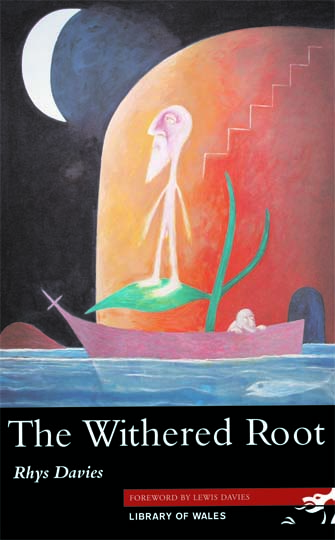Jon Gower takes a look at The Withered Root by Rhys Davies, a rich evocation of a time when religion swept like wildfire throughout Wales.
There is something positively lysergic about this novel, set against the backdrop of the religious convulsion, the revival which brought Wales to its praying knees in 1904 and 1905. It is a book so chock full of visions, lucid dreams and hallucinations – and they are so hyper-vividly described – that one imagines the grocer’s son from Clydach Vale dropping a few tabs of acid while penning it, even though this was written in 1927, a full four decades before Timothy Leary and his West Coast chemical experiments.
Yet, that said, some passages are so hallucinatory that, taken collectively, they read like the opening craziness of Hunter S. Thompson’s Fear and Loathing in Las Vegas segued with The Book of Revelation. There is, for instance, the ‘terrible force of worship’ that sets:
the mind quivering amid broken spheres of split radiance and flaming skies, that opened before the inner vision a kingdom of unearthly emotion, where landscapes were voices of strange chants, where music was carved into symbols of crystal colour, and stars opened into faces of inspired beauty….
Voices issue from throats like threads of flame, trees are red and there are ‘blood-red shadows’ about the white buildings. And in some of the dream sequences you’re really convinced that Rhys Davies, was on something: ‘He lay with a creature whose body was fibrous and damp as the thick stem of a monstrous resinous plant.’ Ah, that’s it, resin. That’s what he was smoking! Only kidding.

by Rhys Davies
The central character of The Withered Root is Reuben Daniel, a young collier who finds he has the ability to fire up a congregation with his spirited oratory and rhapsodic rhetoric. When he first stands up in front of a congregation of the so-called Corinthians and proclaims his own faith, he isn’t to know that soon he will be leading a Christian crusade throughout the land, converting by the dozen with his zealot’s energy, a mix of circus barker and ultra persuasive preacher.
Even among the spare pews and unadorned pulpit of the Nonconformist chapels the Corinthians are pretty Spartan for, as one character puts it,
they are the real children of God. No stink of money is there about their simple halls, no communion sets of silver have they, no pews of costly wood, no coloured glasses in the windows. But in their worship there is a purity as of a morning wind.
When Reuben stands up to offer Corinthian witness, he isn’t like the safe, cosseted ministers of the various Pisgahs, Hebrons and Gerazims, that stand in every town and village:
A being that writhed and sprang about the pulpit like a wrathful angel seemed to possess him. The words that poured in torrents from his mouth dropped like stinging hail in the chapel. A tremendous force shot the words out. And wildly, his head spun about on his thin neck like a globe of fire, his hands invoking the heavens with their frenzied clawing.’ At other times he stand there ‘beautiful…as though great white wings beat about him, his face was glorious to look upon, his voice a poem of divine love.
But a Revival is as much about banishing the temptations of the flesh and finding the path to God (not that members of the congregations, especially the young faction, didn’t often get charged up sexually as well as spiritually, leading to all manner of post meeting shenanigans in lovers’ lanes and on lonely hillsides) and Reuben has his own flesh to scourge. He is smitten by the sister of a friend, a young lady called Eirwen who competes even against Christ for Reuben’s attentions, and this both pains him and powers him through life. Reuben has other human miseries to contend with, too, not least his mother, who has taken to drink and is on her way to being a full-on, full-blown sot.
The novel, and thus Reuben, progress from one vision to the next, from one mystic reverie to the next, the scenes flickering on the reader’s cortex so that he too is transported. At times it’s like looking at all of the Mexican artist Frida Kahlo’s paintings, or those of the Victorian visionary and English Romantic John Martin, at one and the same time – surreal, uplifting, transcendent, almost too much to take in.
Reuben, doomed to spend just one night with Eirwen before his all-too premature death, does live long enough to see his mother convert and pack in the booze. But his own visions darken so that he sees a window rise and a woman with bared breasts leans out to nod at him. He sees that ‘people on the crimson pavements were stiff and straight, made of gleaming metal, moving their limbs like wound-up dolls.’
The Withered Root is a rich evocation of a time when religion swept like wildfire through Wales. At times Davies’ imagination blazes incredibly brightly, setting the very pages on fire. Rhys Davies really is one of our very best Welsh writers and almost criminally neglected.
Here he finds a theme that forces him to write in a different way, and he is fully up to the task. The visions flow and meld even as the reader, paradoxically, gets a very full and real sense of what it was like to live in Wales at a time when faith fell like rain.
You might also like…
Carla Manfredino reviews Psalmody by Maria Apichella, a thoughtful and refreshing collection illustrating the often trivial aspects of love and religion.
Jon Gower is a regular contributor to Wales Arts Review.











